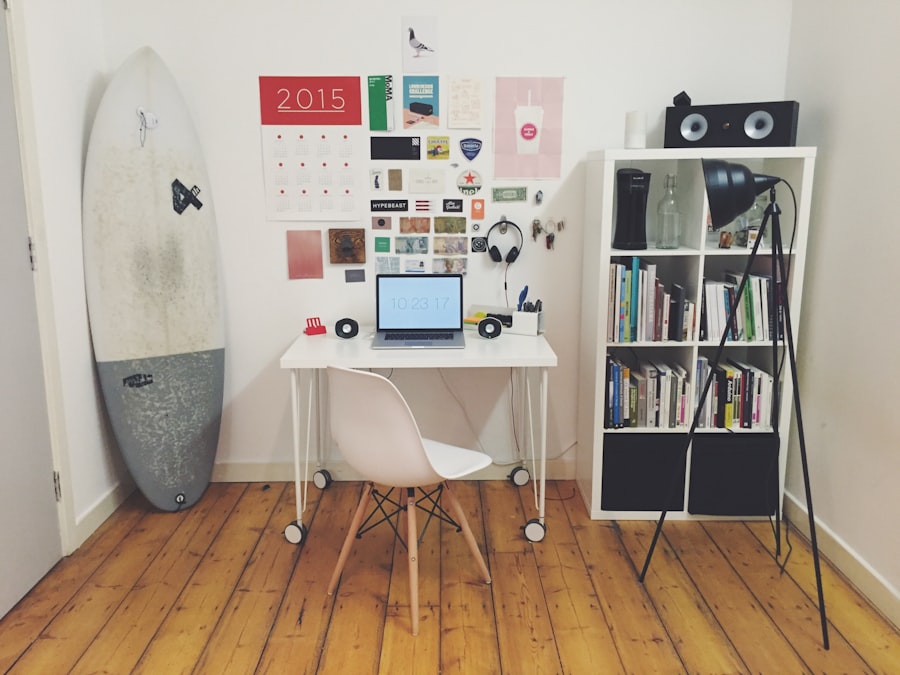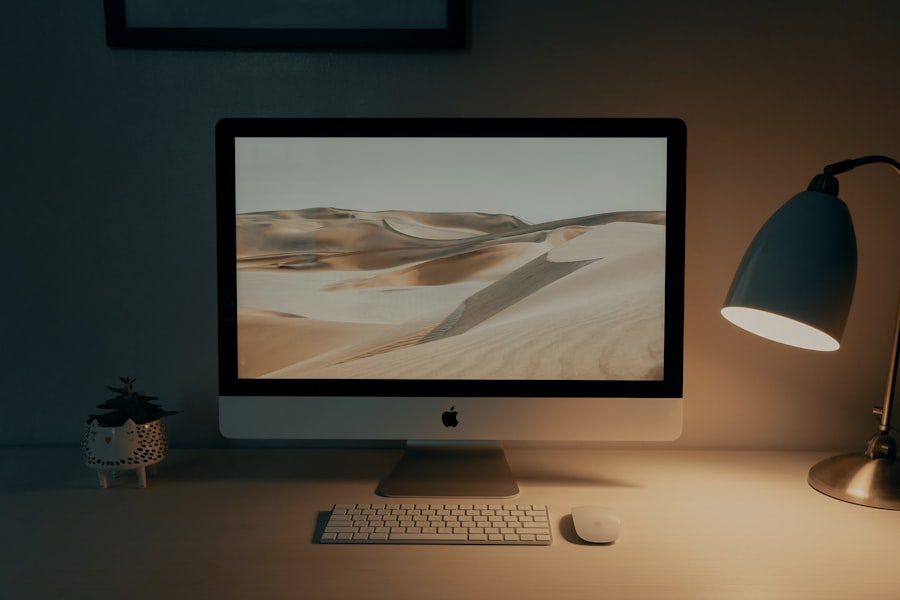Creating a designated workspace is essential for maintaining productivity and focus when working from home. This area should be separate from spaces used for relaxation or leisure activities. Ideally, the workspace should be quiet, well-lit, and equipped with a comfortable chair and a desk or table large enough for work materials.
Personalizing the space with plants, artwork, or other enjoyable items can create a positive and motivating environment. It is important to ensure that the workspace has all necessary tools and equipment, such as a computer, printer, and office supplies, to minimize movement during work hours. Establishing a designated workspace helps create a clear boundary between professional and personal life, which is crucial for maintaining work-life balance.
A designated workspace can also signal to others in the household that you are in work mode. This is particularly important if you live with family members or roommates who may not fully understand the concept of working from home. Having a specific area dedicated to work can help minimize interruptions and distractions, allowing for more effective focus on tasks.
Additionally, a designated workspace can help with mental transitions into and out of work mode, creating a sense of routine and structure in your day. Overall, establishing a designated workspace is crucial for creating a productive and professional environment while working from home.
Key Takeaways
- Establish a designated workspace: Create a dedicated area for work to help separate work from personal life.
- Set a schedule and stick to it: Establish a consistent work schedule to maintain productivity and routine.
- Minimize distractions: Identify and eliminate potential distractions to stay focused during work hours.
- Take regular breaks: Schedule short breaks to rest and recharge throughout the workday.
- Stay organized: Keep a tidy workspace and use tools like calendars and to-do lists to stay organized and on top of tasks.
Set a schedule and stick to it
Identifying Your Most Productive Hours
Start by determining your most productive hours and scheduling your most important tasks during that time. It’s also essential to establish a clear start and end time for your workday to avoid overworking and maintain a healthy work-life balance.
Benefits of Scheduling Regular Breaks
Scheduling regular breaks throughout the day can help prevent burnout and improve overall productivity. By setting a schedule and sticking to it, you can communicate your availability to colleagues and clients, manage expectations, and ensure that others know when you are available for meetings, calls, or collaboration.
Effective Time Management and Prioritization
Setting a schedule can also help you prioritize tasks and manage your time more effectively, leading to increased efficiency and productivity. By establishing specific work hours, you can minimize interruptions during your personal time and create boundaries between work and leisure.
Creating a Sense of Structure and Routine
Overall, setting a schedule and sticking to it is essential for creating a sense of structure and routine while working from home. By doing so, you can maintain productivity, reduce stress, and achieve a better work-life balance.
Minimize distractions

Minimizing distractions is crucial for maintaining focus and productivity while working from home. Start by identifying common distractions in your environment, such as noise from outside, household chores, or personal devices, and take steps to address them. This may involve using noise-cancelling headphones, setting boundaries with family members or roommates, or using website blockers to limit time spent on social media or other non-work-related sites.
Creating a designated workspace, as mentioned earlier, can also help minimize distractions by creating a physical boundary between work and leisure. Moreover, practicing mindfulness techniques, such as meditation or deep breathing exercises, can help train your mind to stay focused and present, even in the face of distractions. Additionally, setting specific times for checking emails or taking breaks can help prevent constant interruptions throughout the day.
By minimizing distractions, you can create an environment that is conducive to deep work and concentration, leading to increased productivity and efficiency. Overall, taking proactive steps to minimize distractions is essential for maintaining focus and achieving your work goals while working from home.
Take regular breaks
Taking regular breaks is essential for maintaining mental and physical well-being while working from home. It’s easy to get caught up in work and forget to take breaks, but doing so can lead to burnout and decreased productivity in the long run. Schedule short breaks throughout the day to stretch, walk around, or engage in activities that help you relax and recharge.
This could include taking a short walk outside, doing a quick workout, or simply stepping away from your desk to rest your eyes. Furthermore, taking longer breaks for meals or leisure activities can help prevent feelings of isolation and maintain a healthy work-life balance. Use this time to connect with family members or friends, pursue hobbies, or engage in activities that bring you joy.
By taking regular breaks, you can prevent mental fatigue and maintain a sense of well-being throughout the workday. Additionally, breaks can also help stimulate creativity and problem-solving by giving your mind the opportunity to rest and reset. Overall, taking regular breaks is essential for maintaining overall health and productivity while working from home.
Stay organized
Staying organized is crucial for managing tasks and deadlines effectively while working from home. Start by creating a daily or weekly to-do list to prioritize tasks and ensure that nothing falls through the cracks. Use digital tools such as project management software or calendar apps to keep track of deadlines and appointments.
Additionally, maintaining a clean and clutter-free workspace can help reduce stress and improve focus. Moreover, establishing clear systems for filing documents, organizing emails, and managing projects can help streamline your workflow and prevent feeling overwhelmed by disorganization. Take time at the end of each day to review your tasks for the next day and tidy up your workspace to start fresh in the morning.
By staying organized, you can create a sense of control and efficiency in your work, leading to increased productivity and reduced stress. Overall, staying organized is essential for managing the demands of remote work effectively.
Communicate with colleagues

Staying Connected through Digital Tools
Effective communication with colleagues is crucial for maintaining collaboration and teamwork while working from home. Utilize digital communication tools such as email, instant messaging, or video conferencing to stay connected with team members and ensure everyone is on the same page regarding project goals and deadlines.
Maintaining Social Connections and Preventing Isolation
Schedule regular check-in meetings or virtual coffee breaks to maintain social connections with colleagues and prevent feelings of isolation. This helps to foster a sense of community and teamwork despite physical distance.
Proactive Communication and Clarity
Be proactive in seeking feedback or clarification on tasks to ensure you are meeting expectations and contributing effectively to the team’s goals. Additionally, be mindful of tone and clarity in written communication to prevent misunderstandings or misinterpretations. By communicating effectively with colleagues, you can maintain a sense of connection and teamwork, leading to increased job satisfaction and overall productivity.
Overall, effective communication with colleagues is essential for maintaining a positive work environment while working from home.
Practice self-care and maintain work-life balance
Practicing self-care and maintaining work-life balance is crucial for preventing burnout and maintaining overall well-being while working from home. Set boundaries between work and personal time by establishing clear start and end times for your workday. Use this time to engage in activities that bring you joy and relaxation, such as spending time with loved ones, pursuing hobbies, or engaging in physical exercise.
Moreover, prioritize self-care activities such as getting enough sleep, eating well-balanced meals, and engaging in activities that help you relax and recharge. This could include meditation, yoga, or simply taking time for yourself to unwind. Additionally, be mindful of signs of burnout or stress and seek support from friends, family members, or mental health professionals if needed.
By practicing self-care and maintaining work-life balance, you can prevent feelings of overwhelm and maintain a sense of fulfillment in both your personal and professional life. Overall, prioritizing self-care is essential for maintaining overall well-being while working from home. In conclusion, working from home presents unique challenges in maintaining productivity and well-being.
By establishing a designated workspace, setting a schedule, minimizing distractions, taking regular breaks, staying organized, communicating effectively with colleagues, and practicing self-care, individuals can create a positive remote work experience that promotes both professional success and personal well-being.
If you’re looking to stay productive while working from home, you may also be interested in learning about the importance of investing in training to safeguard the future. This article discusses the benefits of continuous learning and professional development, which can help you stay ahead in your career, even when working remotely. Check it out here.
FAQs
What are some tips for staying productive while working from home?
Some tips for staying productive while working from home include creating a designated workspace, setting a schedule, taking regular breaks, and minimizing distractions.
How can I create a productive workspace at home?
To create a productive workspace at home, find a quiet area with good lighting, invest in a comfortable chair and desk, and keep the area organized and free from clutter.
What are some effective time management strategies for remote work?
Effective time management strategies for remote work include prioritizing tasks, using time-blocking techniques, and setting clear goals and deadlines for each day.
How can I maintain a work-life balance while working from home?
To maintain a work-life balance while working from home, establish boundaries between work and personal time, communicate your schedule to family members, and make time for regular exercise and relaxation.
What are some common challenges of working from home and how can I overcome them?
Common challenges of working from home include feelings of isolation, difficulty staying motivated, and blurred boundaries between work and personal life. To overcome these challenges, it’s important to stay connected with colleagues, set clear boundaries, and establish a routine.



